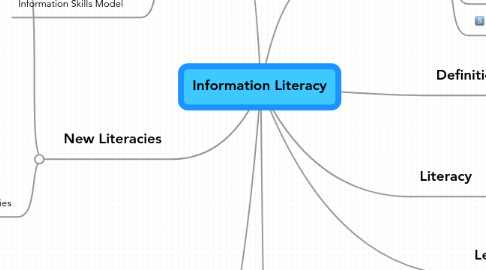Information Literacy
by wY Kan

1. Teaching IL
1.1. Curriculum
1.2. Pedagogy
1.3. Assessment
1.4. Tools
2. Models
2.1. The Big6 Information Problem Solving
2.2. Information Search Process
2.3. Stripling and Pitts Research Process Model
2.4. Pathways to Knowledge Information Skills Model
3. New Literacies
3.1. Traditional Literacies
3.1.1. Reading
3.1.2. Writing
3.1.3. Speaking
3.1.4. Listening
3.2. New Literacies
3.2.1. Information Literacy
3.2.1.1. Identifying what information is needed
3.2.2. Print Literacy
3.2.3. Visual Literacy
3.2.3.1. Understanding and produce visual messages
3.2.4. Ditigal Literacy
3.2.4.1. Using digital technology, communication tools or networks to locate, evaluate, use and create information
3.2.5. Media Literacy
3.2.5.1. Ability to question, analyze, interpret, evaluate, and create media messages
3.2.6. Social Networking Literacy
3.2.7. Multiliteracies
3.2.8. Tool Literacy
3.2.8.1. Using tools to manage and create information
3.2.9. Critical Literacy
3.2.9.1. Ability to question, challenge and evaluate the meanings and purposes of texts
4. Literacy
4.1. Traditional
4.1.1. Listening
4.1.2. Reading
4.1.3. Speaking
4.1.4. Writing
4.2. Additional
4.2.1. Viewing
4.2.2. Representing
5. Information is
5.1. a word or picture
5.2. a thought or emotion
5.3. a smell
5.4. a touch
5.5. sound
6. Definition
6.1. To be information literate, a person must be able to recognize when information is needed and have the ability to locate, evaluate, and use effectively the needed information (American Library Association)
6.2. it is an intellectual activity that employs a set of strategies to successfully complete information work activity or solve a problem
7. Level
7.1. Level 1: Personal Use
7.2. Level 2: Professional Use
7.3. Level 3: Innovative Use
8. Framework Objectives
8.1. To enable students to master the necessary skills to comprehend, locate, analyse, critically evaluate and synthesise information and apply their knowledge to inform decisions and problem solving
8.2. To develop students as reflective learners who are able to plan, reflect upon and regulate their process of inquiry in a rapidly changing, information-based environment
8.3. To enable students to appreciate that being an independent learner will contribute to personal growth, enjoyment and lifelong learning
8.4. To empower students with greater autonomy and social responsibility over the use of information in their individual as well as collaborative learning

